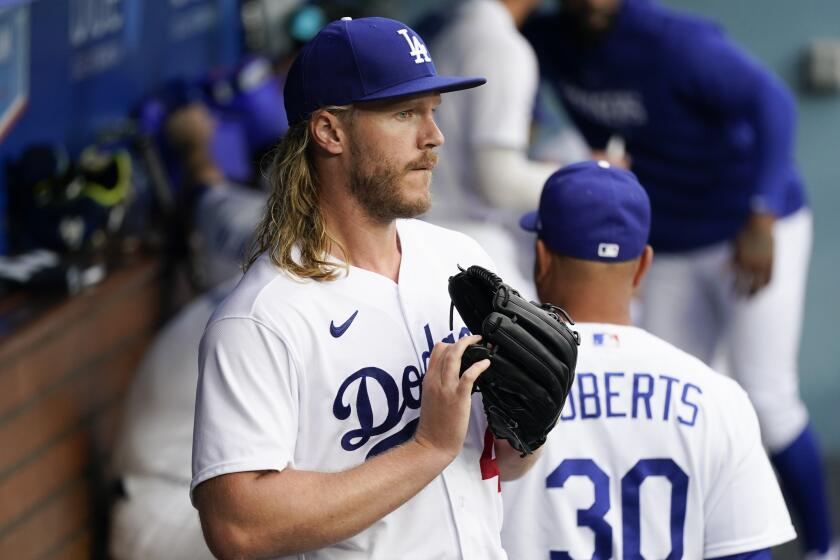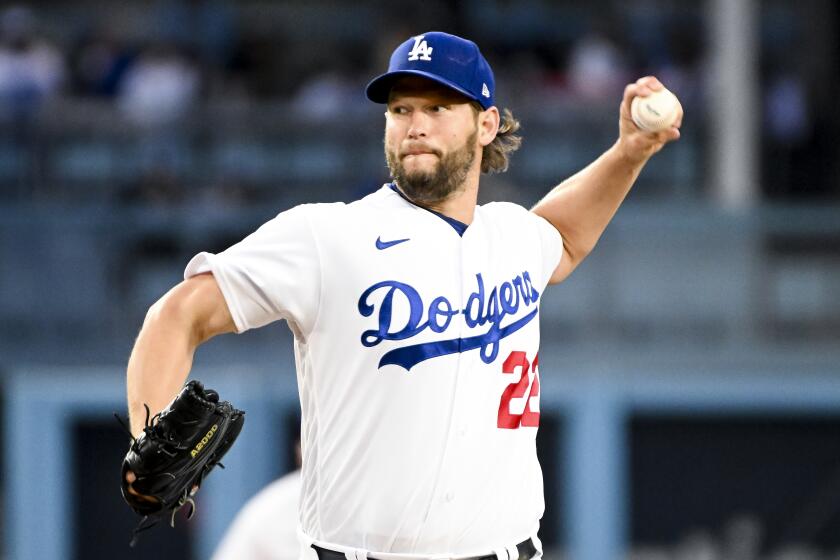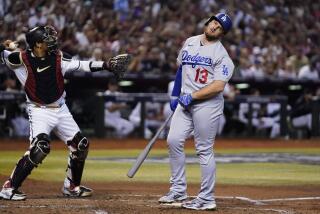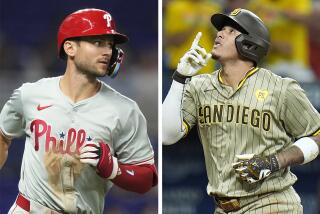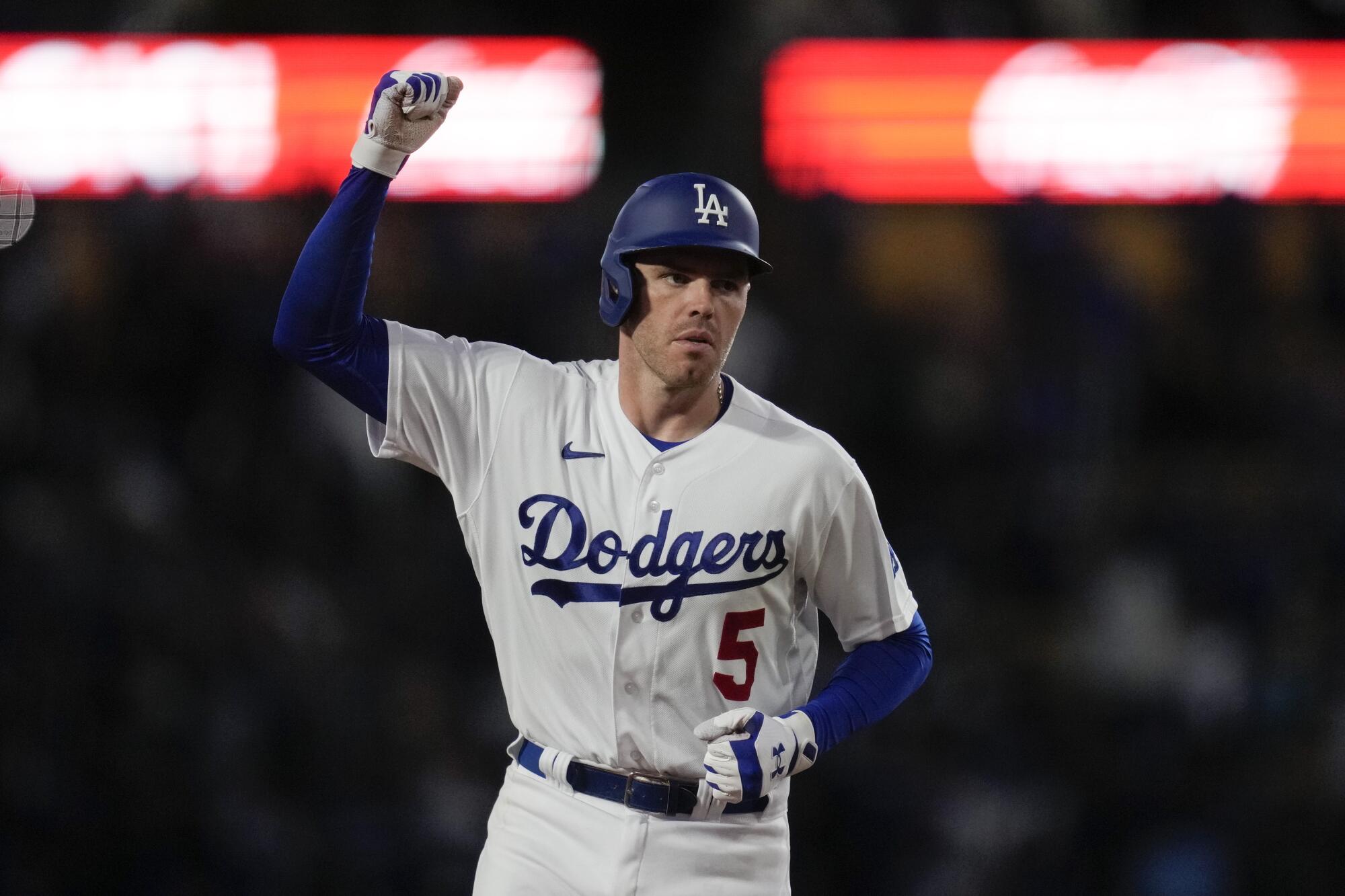
It hasn’t been a typical recipe for success.
After leading the majors in scoring during their historic 111-win campaign last season, the Dodgers lost three All-Stars in free agency, then their starting shortstop to an injury in spring training.
They filled those voids with unproven rookies, established-but-aging veterans, and other low-cost additions that led to scrutiny over the winter.
Noah Syndergaard said he would give his “hypothetical first born” to be his old self again, but the Dodgers can’t count on that happening.
Beyond their top three bats — Freddie Freeman, Will Smith and Mookie Betts — almost every other hitter in their lineup has slumped through at least some stretch of the season’s first two months, leading to a long list of potentially troubling indicators:
A team batting average of .242, ranking 21st in the majors.
A combined strikeout total of 507, more than all but five teams.
And on most nights, a batting order filled with inconsistent producers, several of whom are flirting with the Mendoza line (a .200 batting average).
“When we put together this ballclub,” manager Dave Roberts acknowledged earlier this year, “we felt that the average, that the hit tool, was going to play a little bit more than it has.”
And yet…
The Dodgers are leading the National League in scoring at almost 5.6 runs per game, adding to their total with a 21-run outburst in three games against the Washington Nationals this week.
They are second in the majors in home runs and on-base-plus-slugging percentage, first in walks and fourth in Baseball Reference’s all-encompassing OPS+ (an advanced metric that accounts for ballpark factors and other offensive variables).
While their typically strong pitching staff has battled injuries and sub-par performance (ranking tied for 21st in MLB in team ERA), it has been the team’s collection of patchwork, streaky but ultimately prolific bats that has them entering June with the best record in the NL.
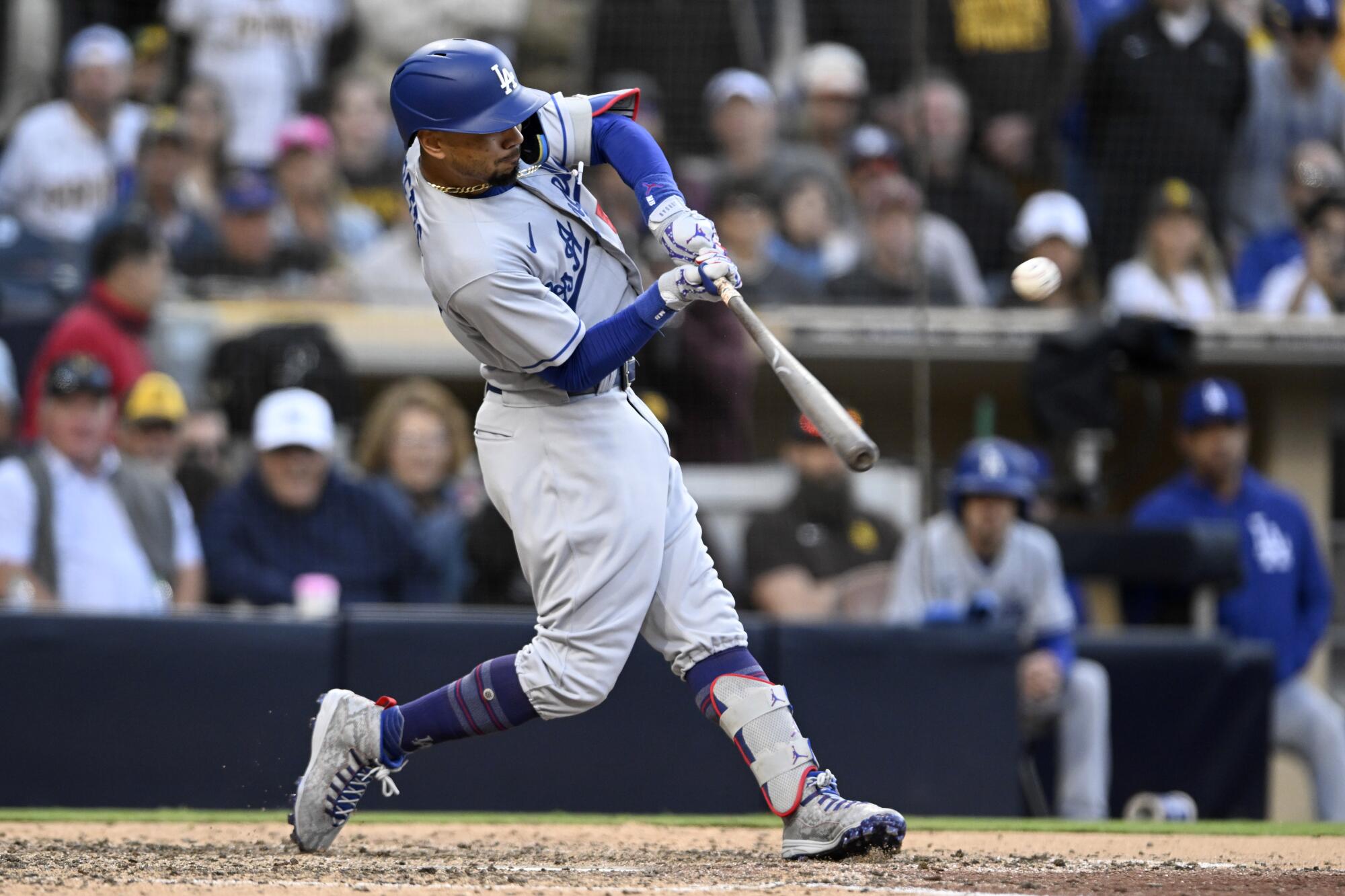
And though it might not be the identity the Dodgers expected to have at the plate, it’s one they’re pleased to see work anyway, hopeful the unorthodox formula can be sustained — and improved — over the remainder of the season.
“How we are doing it is a little bit different than how I thought coming into the year,” president of baseball operations Andrew Friedman said. “But [it’s] not surprising that we are where we are in offensive categories, because it is a talented group.”
No doubt, the Dodgers have been carried first and foremost by their superstar core.
Freeman was perhaps MLB’s best hitter in May, finishing the month on a 20-game hitting streak — and with a .346 average, 1.008 OPS and MLB-leading 34 extra base hits on the season — to vault him into the early MVP race.
Smith (.958 OPS) and Betts (.872 OPS) haven’t been far behind him, while Max Muncy (17 home runs) and J.D. Martinez (12 home runs) exploded for monster months in April and May, respectively.
But for the entire team to produce at this pace, the Dodgers have needed other cogs to click as well.
The rest of their new-look lineup has capitalized on platoon roles and excelled in situational opportunities. Their rearranged coaching staff has taken the franchise’s long-established principles — wearing out opposing pitchers in search of an in-the-zone mistake — to new extremes.
They don’t consider themselves a finished product, and are wary of red flags that could suggest an offensive regression later this season.
But to this point, they have taken a lineup viewed as a potential weakness entering the season and turned into an expectation-shattering, early-season-defining strength.
“I’ve been saying it all year, this is a really good offense,” Martinez said. “It’s deep. Guys that don’t give away at-bats, don’t give away outs. It just seems like, it doesn’t matter how far out of reach the game might feel. Our offense is dangerous.”
When explaining the evolution of the offense from last season to this one, Muncy was careful not to use the word “replace.”
This past offseason’s departures of Trea Turner, Justin Turner and even the struggling Cody Bellinger were losses “you can’t replace,” Muncy said. Gavin Lux’s season-ending knee injury this spring represented another blow.
Alas, the team “brought in guys that complement the offense really well,” the veteran third baseman noted. “Guys understand what needs to be done.”
Guys such as Martinez, the 35-year-old designated hitter who settled for less money to sign a one-year deal with the Dodgers and reunite with former hitting coach Robert Van Scoyoc.
After a slow start and three-week absence on the injured list, the slugger has blossomed in recent weeks. He is on a 15-game hitting streak. He is leading the NL with a .611 slugging percentage. He has hit seven home runs in his last 11 games.
“I just grinded with Rob,” Martinez said after a three-RBI game Tuesday. “We were able to find something.”
Jason Heyward is another example. Released by the Chicago Cubs this past winter, the 33-year-old outfielder came to Los Angeles on a minor-league deal in the offseason. He rebuilt his swing with Van Scoyoc and the Dodgers’ other co-hitting-coach, Aaron Bates, lowering his hands and flattening his bat path.
He is having his best season in years, with six home runs, an .822 OPS and the second-best walk-to-strikeout ratio on the team.
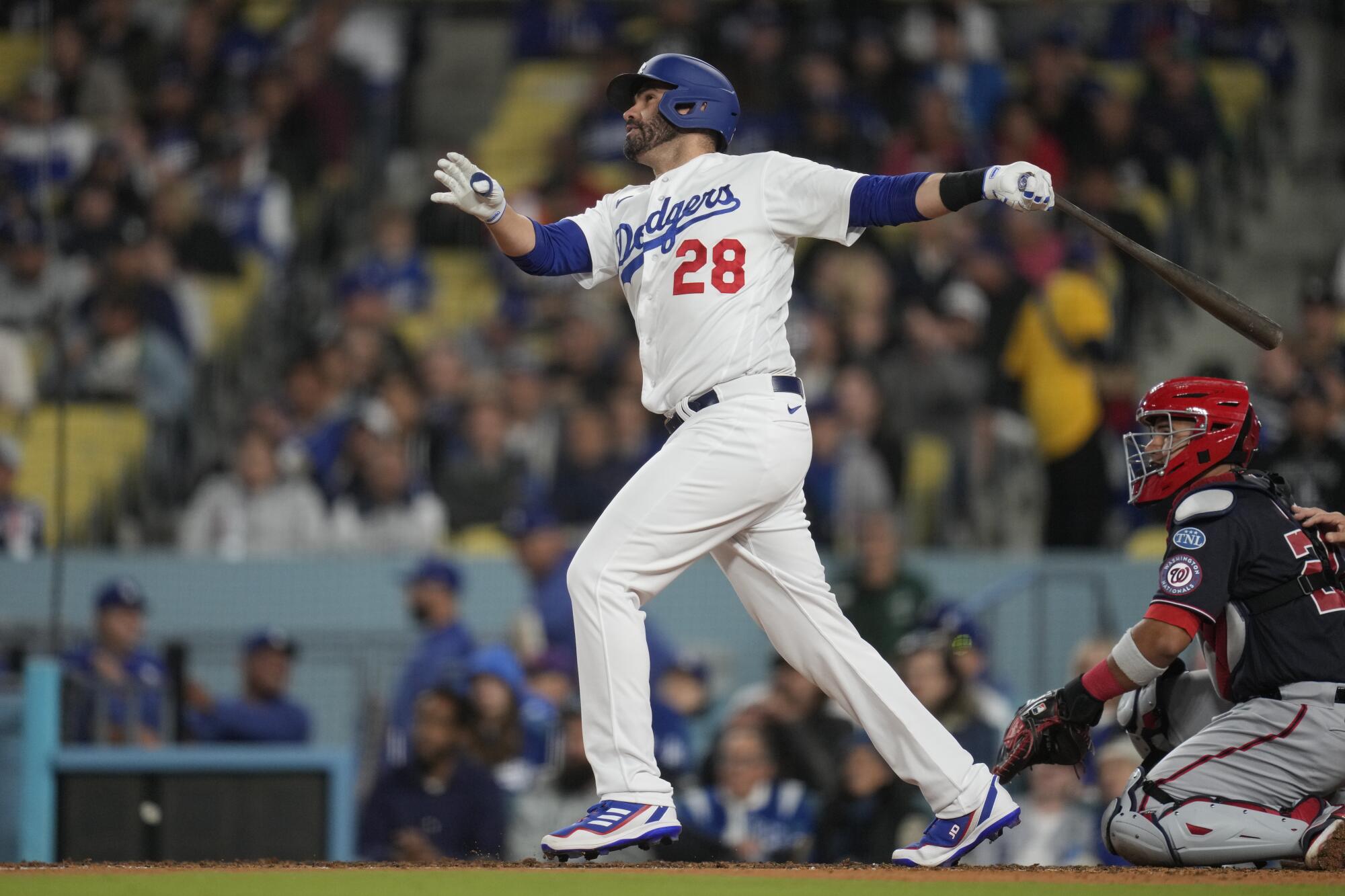
“These guys bring a different kind of energy,” Bates said of Heyward and such other veteran additions as David Peralta and Miguel Rojas. “They’re just professional hitters up and down. We’re never really out of a game.”
The one thing few of them have, however: Good batting averages.
Of the Dodgers 13 regulars, only four are batting better than .235. Five of them are striking out at least a quarter of the time. Overall, the team isn’t performing nearly as well against fastballs as it did last year, either, ranking 27th in average and 10th in OPS.
Where the Dodgers have compensated, however, is with their quality of at-bats.
They’ve been the most selective team in the majors, swinging at just 44.4% of pitches. They’ve chased even less, swinging at only 23.5% of pitches thrown outside the strike zone, also an MLB-low.
As a result, they’ve stressed opposing pitchers (in the NL, only St. Louis has more plate appearances against relievers than the Dodgers). They’ve worked hitters counts (they have the most three-ball counts in the majors). And when they’ve gotten mistakes over the plate, they’ve taken advantage, trailing only the Tampa Bay Rays in home runs with 96.
“There’s so many different ways you can win a ballgame,” Muncy said. “Up and down the lineup, guys are buying into that.”
Van Scoyoc and Bates have helped establish that culture. Van Scoyoc is now in his fifth year as a hitting coach. Bates, a former Dodgers assistant hitting coach, was promoted alongside him this winter after fielding interest from several other clubs, including Colorado, according to multiple people with knowledge of the situation who weren’t authorized to speak publicly.
The addition of game planning and communication coach J.T. Watkins has also been key. The former Boston video coordinator — who was once suspended for his role in a sign stealing operation by the Red Sox — has taken the lead on scouting opposing pitchers and crafting game plans for each hitter, receiving rave reviews for his ability to compile comprehensive, predictive reports.
“He can find some crazy things,” Freeman said. “He’s been a wonderful hire.”
The areas where the Dodgers can still improve are clear.
They’re trying to get more consistency from such veterans as Chris Taylor, Trayce Thompson and even Muncy — a trio that entered Wednesday with as many home runs as singles.
Their two rookie hitters, Miguel Vargas and James Outman, are still settling into the big leagues — with Vargas following a slow start with steady improvements in recent weeks, while Outman has gone the opposite direction after winning Rookie of the Month in April.
Clayton Kershaw disagreed with the Dodgers’ plan to honor the Sisters of Perpetual Indulgence on Pride Night, so he pushed to relaunch Christian family day.
Though the team’s batting average has gotten better of late (.224 in April; .259 in May), the internal hope is that more remains in the tank.
“I actually think this team is a way better hitting team than we’ve shown, a team that can have a lot more hit collectors,” Friedman said. “Even if it backs up some in the power department, this team is a more well-rounded offense that we haven’t gotten the full flavor of yet.”
Still, they’ve been able to deliver when it has mattered, posting the sixth-best OPS and 11th-best batting average with runners in scoring position.
“[We have] different kinds of hitters in our lineup that can kind of beat you in different ways,” Freeman said. “When you’ve got a few guys clicking at the right time, this is usually what happens.”
As Bates discussed his group last week, he pointed to one more intangible quality — a difficult-to-define, but easy-to-see aspect of a team outpacing almost all preseason expectations.
On their recent 10-game trip, the Dodgers faced early-inning, multi-run deficits seven times.
Their lineup managed to regroup, rally and at least get the team back in the game (at the very least, trimming the deficit to one run, if not tying the score or taking a lead) in all but one.
“In general, it’s a never-quit type of group,” Bates said. “That’s what’s really exciting about our offense.”
More to Read
Are you a true-blue fan?
Get our Dodgers Dugout newsletter for insights, news and much more.
You may occasionally receive promotional content from the Los Angeles Times.

